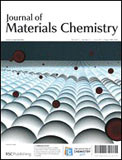Chekina N, Horak D, Jendelova P, Trchova M, Benes MJ, Hruby M, Herynek V, Turnovcova K, Sykova E. J. Mater. Chem., 2011, 21, 7630–7639. IF: 5,101

Abstract:
The simultaneous combination of optical and magnetic resonance imaging (MRI) would greatly benefit in vivo disease diagnosis as well as in situ monitoring of living cells. In order to design dual detection of cells involving simultaneous imaging by fluorescent microscopy and MRI, nanoparticles with two reporters, a fluorescent dye and a superparamagnetic core, included in one particle were synthesized and characterized. The γ-Fe2O3 nanoparticles obtained by coprecipitation and oxidation were coated with silica (SiO2) or carboxymethyl chitosan (CMCS) and labeled with fluorescein isothiocyanate (FITC). The fluorescent label was covalently bound to the nanoparticles and was not quenched by the iron oxide core. The nanoparticles successfully labeled rat mesenchymal stem cells (rMSCs) in vitro. Relaxation time measurements found large amounts of iron inside the cells with FITC-labeled γ-Fe2O3-SiO2-AP nanoparticles. Both MR and fluorescent imaging of a rat brain with implanted rMSCs labeled with FITC-labeled CMCS-modified silica-coated γ-Fe2O3 nanoparticles were performed.